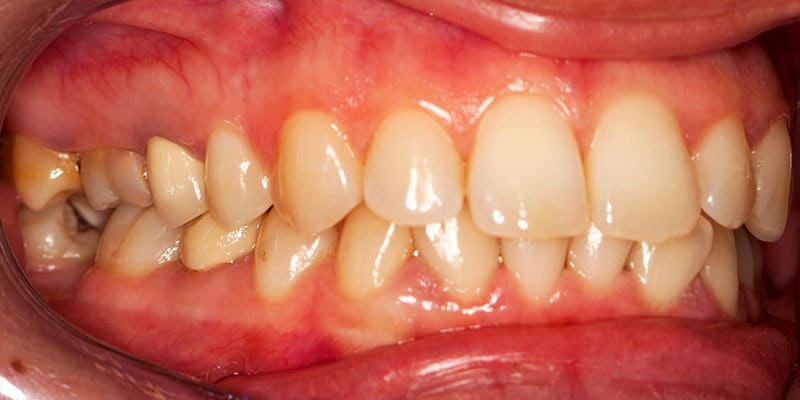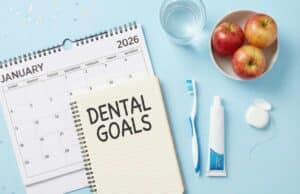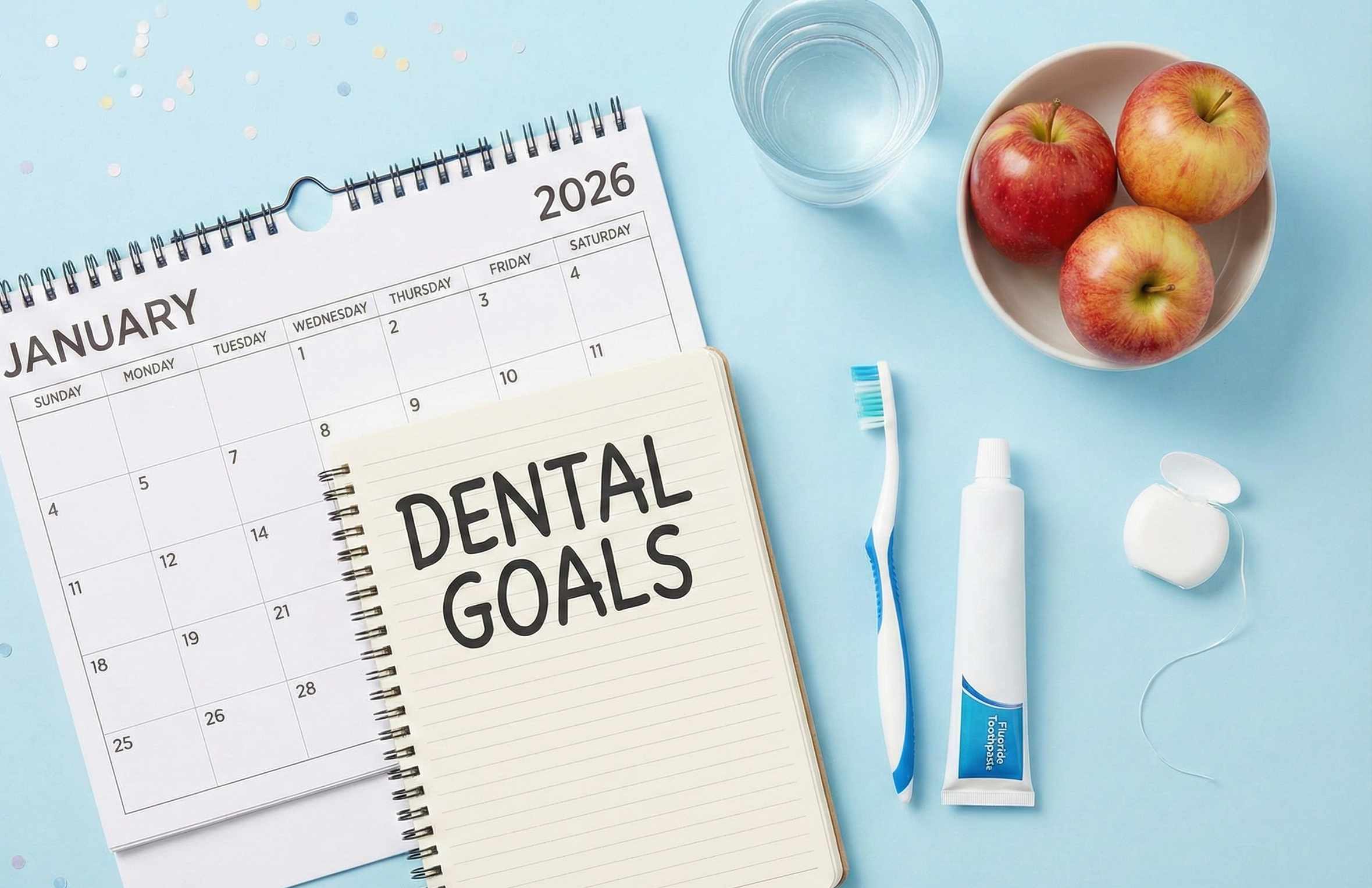- What causes gum disease?
- What can happen if gum disease goes untreated?
- Diagnosing gum disease at the dentist’s office
- What kind of gum disease treatment is available?
- How to beat gum disease and prevent gingivitis
Late October brings us pumpkin spice lattes, changing fall colours, and a host of frightening movies to watch. As we march closer to the end of month, our thoughts turn to the ghosts, ghouls, and goblins that haunt us during the Halloween season.
But what’s scarier is the thought of tooth decay and gum disease that come as a result of too much sugary, sticky Halloween candy!
Also known as periodontal disease, this condition occurs when an infection in your mouth attacks the tissue that holds your teeth in place. If left untreated, your gums could weaken and cause a number of dental health issues.
How can you tell if you have gum disease? Let’s have a look at what causes gum disease, the telltale signs of infection, and how your dentist can help you prevent it.
What causes gum disease?
Our mouths are full of germs. Germs and bacteria on your teeth can harden over time if not removed properly, creating a film called calculus (or tartar). Calculus can be difficult to remove, and will continue to grow and result in gum inflammation. This is a condition known as gingivitis.
If left untreated and allowed to progress, the calculus deposits will begin edging down below your gum line, possibly forming periodontal pockets that lead to periodontal disease.
What can happen if gum disease goes untreated?
Untreated gum disease can lead to more severe dental problems. The infection that’s attacking your gums will cause them to separate from your teeth and the supporting bone. It will also impact the integrity of your jawbone’s ability to hold your teeth in place, causing them to become loose and eventually fall out.
Fortunately, most instances of periodontal disease are easy to detect long before it reaches a critical point. You can look for the signs of infection at home, so you can seek treatment from your dentist to prevent the condition from getting any worse.
How Can You Tell if You Have Gum Disease?
When you’re brushing your teeth in the evening, here’s what to look for to determine if you might have periodontal disease:
- Gum inflammation or redness
- Bleeding gums
- Tender, painful gums upon contact
- Blood on your toothbrush, floss, or when you rinse in the sink
Infected gums might also be the culprit if you have:
- Persistent bad breath (halitosis)
- A metallic taste in your mouth
- Pus discharge from the gums (a condition known as pyorrhea)
- Sensitive teeth to hot or cold food and drinks
- Loose teeth or tooth loss
- Pain when chewing
- Gum recession or teeth that look longer than usual
Other factors can contribute to advancing periodontal disease, such as your age, if you smoke, a genetic predisposition to periodontal disease, clenching or grinding your teeth due to stress, certain prescription medications, and poor nutrition.
If you detect any of these signs, you should make an appointment with your dentist as soon as possible for treatment.
Diagnosing gum disease at the dentist’s office
When checking for gum disease, your dentist or dental hygienist will:
- Discuss your medical history and lifestyle habits (e.g. smoking, diet) that may contribute to periodontal disease
- Check your gums for inflammation
- Measure periodontal pockets around the teeth
- Take x-rays to look for bone loss
If your dentist finds the presence of periodontal disease, they’ll either discuss your treatment options with you directly, or refer you to a periodontist who specializes in gum treatment.
What kind of gum disease treatment is available?
At the heart of treating gum disease is to control the spread of infection to prevent further damage to your gum tissue and bone, as well as repair any damage the infection might have caused.
The approach your dentist or periodontist will take depends on the extent or your condition, and can include nonsurgical or surgical treatments or a combination of both.
Nonsurgical treatment options include:
- Scaling: Removing tartar and bacteria from the surface of your teeth and gums using dental instruments, laser, or through ultrasound
- Root planing: Smoothing the root surface to remove tartar and bacteria
- Antibiotics: Administered orally or topically through gels or mouth rinses to control bacteria
Your dentist or periodontist might also deem surgery necessary to help fix your teeth, gums, and jawbone. They will discuss these safe, simple procedures with you and answer all of your questions and concerns:
- Flap surgery: Surgical correction of the gums and bone supporting your teeth to reduce the periodontal pockets
- Soft tissue grafts: Insertion of tissue in the gum line to build up the tissue, prevent further gum damage, and help your teeth look and feel better
- Bone grafts: Buildup of your jawbone with donor tissue to repair damage caused by infection
Of course, any treatment provided by your dentist or periodontist must be supported by good oral hygiene habits at home, as well as lifestyle changes that prevent oral infections from coming back.
How to beat gum disease and prevent gingivitis
Whether or not you’ve had gingivitis or periodontal disease, you can significantly reduce your chances of developing them or having them reoccur by following as few simple steps to keep your teeth and gums strong and healthy:
- Brush your teeth twice per day using a soft toothbrush and fluoridated toothpaste
- Floss at least once per day to remove plaque from between the teeth
- Visit your dentist regularly for cleanings and check-ups
- If you smoke, try to quit to protect your gum tissue
- Cut down on sugary, sticky candy and snacks
Don’t get us wrong – we love Halloween and all the other holidays where we can indulge in special sweet treats. However, we love bright, glowing smiles full of healthy teeth and gums even more.
Happy Halloween! Enjoy the shrieks, scares, and candy – but don’t forget to brush!
How Can You Tell if You Have Gum Disease? Find out from Yonge Eglinton Dental in Toronto
If you’ve noticed receding gums, swollen gums, or sensitive teeth, you might have periodontal disease. Our dental team welcomes you into our location in midtown Toronto to help treat, cure, and prevent problems with your oral hygiene. Give Yonge Eglinton Dental a call today at 416-932-2222 or book an appointment online. We’ll be happy to see you!
Concerned about visiting the dentist? Read about how we protect the health and safety of our patients and staff so your family can seek proper dental care with peace of mind.








